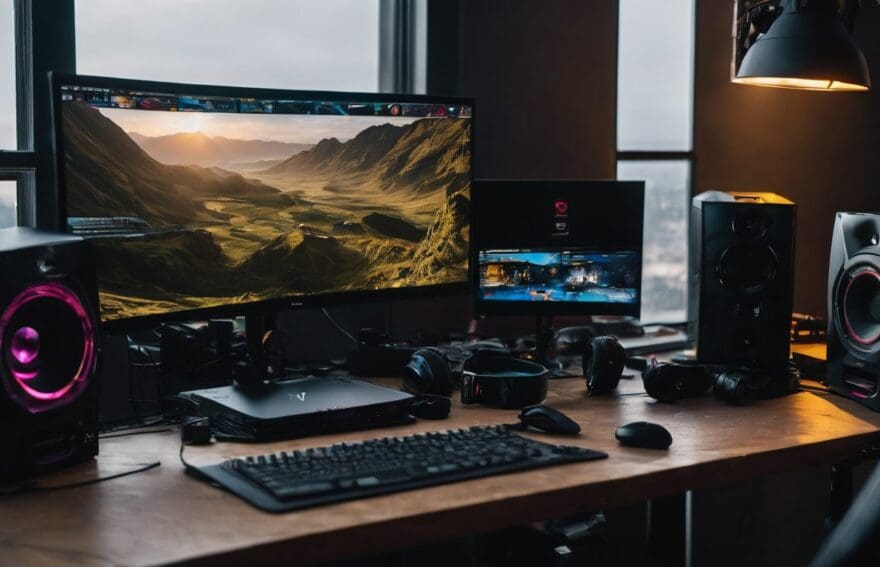A Day in the Life of an Esports Athlete

Updated On: October 29, 2025 by Aaron Connolly
Are you a passionate gamer wondering about the daily life of professional esports players? Well, I’ve been there too. Did you know that only 1% of gamers make more than $100K annually? In this blog post, we’ll explore the daily routine, challenges, and opportunities in the world of esports athletes. Get ready to dive into the exciting world of pro gaming!
What is an Esports Athlete?
An esports athlete is a professional gamer who competes in video game competitions at the highest level. We dedicate countless hours to mastering games, fine-tuning our reflexes, and understanding intricate game strategies.
Our daily lives revolve around a rigorous training schedule that often involves team practice sessions, solo drills, and scrimmage matches against other top teams.
We balance on the cutting edge of competitive gaming, where mental agility is as essential as physical precision. To stay ahead, we review match recordings analytically and work on personal performance enhancements relentlessly.
It’s not just about playing; it’s about evolving our skills every day to remain at the pinnacle of an ever-changing esports industry.
The Life of a Professional Esports Player
Our daily routine as professional esports players revolves around training, team dynamics, and tournament schedules. We spend hours practising and strategising to improve our gaming performance.
Our gaming house environment fosters a collaborative spirit that drives us towards success in the competitive gaming industry.
Daily routine
We all have our morning rituals, and for esports athletes like us, they’re crucial to setting the tone for a successful day. Our schedule is jam-packed from dawn till well after dusk, balancing intense practice with rest and personal care.
- Rise early, usually around 7 AM, to start the day refreshed and ready.
- Begin with a healthy breakfast that provides energy for the long hours ahead.
- Engage in a mandatory workout session to keep physically fit; strong bodies support sharp minds.
- Review the day’s objectives during a team meeting where we plan strategies and discuss tactics.
- Dive into individual practice sessions focusing on reflexes, game-specific skills, and decision-making.
- Break for lunch around noon; nutrition plays a vital role in maintaining peak performance levels.
- Afternoon hours are filled with scrims – scrimmage matches against other professional teams to hone our teamwork.
- Solo/Duo Queue games follow scrims, allowing us to work on personal mechanics away from team dynamics.
- Take short breaks between gaming sessions to prevent fatigue; this includes stretching or quick walks.
- Come evening, it’s time for another healthy meal together as a team – bonding over food is important too!
- Post – dinner involves more strategy work; we watch match recordings to analyse both our performances and those of our opponents.
- Conclude formal training by 10 PM but often continue playing solo games or reviewing game footage individually.
- Wind down with activities unrelated to gaming – reading or listening to music helps clear our minds before bed.
- Finally hit the pillows around 2: 30 AM after daily streams or additional practice when tournaments loom.
Team dynamics
As a pro gamer, we understand that team dynamics are crucial to success in the esports industry. Effective communication and coordination with teammates are essential during gameplay and tournament preparations.
Constructive feedback and mutual respect within the team help in fostering a positive gaming environment, leading to improved performance. Adapting to different play styles and coordinating strategies effectively can make or break a game, emphasising the significance of strong team dynamics in professional gaming.
To function as one cohesive unit, a deep understanding of each teammate’s strengths is key for leveraging them during matches. Team synergy is vital – when every member plays their role suitably, it significantly enhances overall performance during scrims and tournament matches.
Training and practice
- Engage in daily scrims, which are scrimmage matches that simulate real tournament scenarios.
- Dedicate time to Solo/Duo Queue games to improve individual skills and decision – making.
- Analyse match recordings to identify strengths, weaknesses, and areas for improvement.
- Participate in mandatory workouts to maintain physical fitness and prevent burnout.
- Set specific goals for skill development and review performance regularly.
- Work on developing strategies with the team, emphasising teamwork and synergy.
Physical and Mental Wellbeing
Maintaining physical fitness is crucial to our performance, as well as managing stress and mental well-being. Looking after ourselves off the screen is just as important as honing our skills on it.
If you want to discover more about the daily life of an esports athlete, keep reading!
Importance of physical exercise
Physical exercise is crucial for professional gamers to maintain their overall health and wellbeing. Regular physical activity improves endurance, reduces the risk of injuries, and enhances mental focus during intense gaming sessions.
It also assists in managing stress levels and promotes better sleep patterns, allowing players to stay refreshed and alert. Incorporating a balanced fitness regime can prevent potential burnout that often accompanies the demanding lifestyle of an esports athlete.
By engaging in activities such as cardio workouts, strength training, and flexibility exercises, players can improve their performance on the virtual battlefield while safeguarding their long-term health.
In addition to physical benefits, regular exercise has been linked to enhanced cognitive function. This directly impacts a player’s ability to strategise effectively during competitive gameplay and maintain peak mental acuity throughout extended tournaments.
Mental health and stress management
Transitioning from the importance of physical exercise, maintaining mental health and managing stress is crucial for professional gamers. Balancing rigorous training schedules and demanding tournament competitions can take a toll on an athlete’s mental well-being.
The high-pressure environment of esports can lead to burnout and other mental health challenges, making it essential for players to prioritise self-care.
Pro gamers should establish regular routines that include relaxation techniques, such as meditation or mindfulness exercises, to manage stress levels effectively. Seeking support from peers and professionals in the gaming community can also provide valuable resources for coping with the psychological demands of competitive gaming.
Strategies and Preparation
We’ll discuss the importance of watching match recordings and analysing performance for improvement. Interested to learn more about the life of an esports athlete? Keep reading!
Watching match recordings
Professional gamers enhance their skills by regularly reviewing match recordings. This helps them to analyse their gameplay and identify areas for improvement. Here’s how professional esports athletes leverage match recordings to elevate their performance:
- Studying opponent strategies and tactics to anticipate and counter in-game moves.
- Analysing individual and team performance to fine-tune coordination and communication.
- Identifying mistakes and errors to avoid repeating them in future matches.
- Learning from successful plays and manoeuvres to incorporate effective techniques into their own gameplay.
- Gaining insights into the broader gaming meta, allowing them to adapt strategies according to the evolving competitive landscape.
Analysing performance and improvement
Professional gamers carefully study their match recordings to identify strengths and weaknesses. This process allows them to pinpoint areas for improvement and fine-tune their strategies.
By analysing gameplay, they can adapt tactics and refine their skills, ultimately enhancing their performance in future matches.
Diligent practice combined with thoughtful reflection on individual and team performance is crucial for continual improvement. Players utilise this methodical approach to stay ahead of the competition, striving to maintain a competitive edge in the dynamic world of esports.
The Reality of Being a Pro Gamer
Early mornings and late nights are a reality for pro gamers, as they compete in tournaments across different time zones. To find out more about the challenges and opportunities in the esports industry, keep reading!
Early mornings and late nights
Professional gamers often start their day in the early hours, diving into training sessions, analysing game strategies, and participating in rigorous practice matches with their teams.
The demanding tournament schedules mean that late nights are common as players compete against opponents from around the world. After a long day of gaming and streaming, pro players typically wrap up their days around 2:30 AM before heading to bed.
This intense schedule requires discipline and dedication to thrive in the competitive world of esports.
Financial stability
Achieving financial stability as an esports athlete can be challenging, with only a small percentage of players earning substantial income. The reality is that the average salary for professional gamers falls below $100,000 annually, making it essential for players to consider their long-term financial security.
This requires careful budgeting and planning for career transitions beyond competitive gaming. It’s crucial to recognise the importance of saving and investing wisely to ensure future financial stability in a dynamic and evolving industry.
Players should actively seek opportunities beyond competing in tournaments to secure their financial future. Exploring avenues like content creation, streaming, sponsorship deals, and brand partnerships can provide additional sources of income while also building a personal brand.
Challenges and Opportunities in the Esports Industry
The esports industry presents unique challenges and opportunities, with the impact of technology shaping the future of gaming and a growing emphasis on inclusivity and diversity in the gaming community.
Interested to know more? Keep reading to get an inside look at the day-to-day life of an esports athlete.
Impact of technology
Technology has revolutionised the esports industry, providing gamers with advanced tools and platforms for training and competition. The introduction of virtual reality (VR) and augmented reality (AR) has enhanced the gaming experience, allowing players to immerse themselves in more realistic game environments for improved skill development.
Additionally, advancements in streaming platforms have enabled professional gamers to connect with their audience and fellow players worldwide, fostering a more engaged and connected gaming community.
Esports athletes can now utilise sophisticated analytics software for performance analysis, enabling them to review gameplay footage in detail to identify strengths and areas for improvement.
Inclusivity and diversity in the gaming community
In the gaming community, inclusivity and diversity are essential for creating a welcoming environment. It’s important to ensure that everyone feels represented and accepted regardless of their background.
Embracing diversity not only enriches the gaming experience but also fosters a sense of belonging for all players. Encouraging diverse representation in games, tournaments, and esports teams can help break down barriers and provide equal opportunities for all passionate gamers.
Professional gaming organisations should actively promote inclusivity by supporting initiatives that aim to increase diversity in competitive gaming. This can involve providing resources, mentorship programmes, and scholarships to underrepresented groups within the gaming community.
Conclusion
In conclusion, the life of an esports athlete is filled with rigorous training, demanding schedules, and potential financial instability. Professional gamers face challenges such as burnout and mental stress while striving for success in a highly competitive industry.
Despite the difficulties, the opportunity to excel in a growing field and contribute to the gaming community drives these individuals to push through obstacles on a daily basis.
FAQs
1. What does an esports athlete do every day?
An esports athlete follows a disciplined practice schedule, including solo or duo queue games and team scrimmages to sharpen skills for gaming tournaments.
2. How much time do esports athletes spend training?
Esports training is intensive; pro gamers can spend many hours each day, similar to a full-time job, practising and reviewing game strategies.
3. Do esports athletes earn salaries like other professional sports players?
Yes, esports athletes often receive a salary for their participation in gaming teams and can earn prize money from winning at gaming tournaments.
4. Can someone be both an esports athlete and a student?
Certainly! It’s possible to be a student-athlete; however, maintaining this balance requires good time management to accommodate both studies and the demanding gamer life of an esport lifestyle.
5. What’s the routine like before big Esports competitions?
Before major gaming contests, an esports athlete will likely ramp up their practice with longer scrim sessions and review previous matches to prepare effectively for high-stakes competition.


